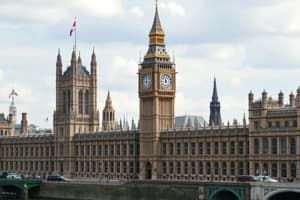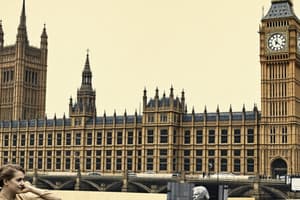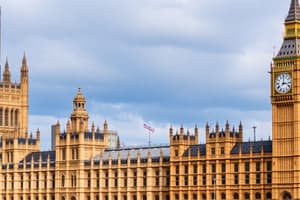Podcast
Questions and Answers
The monarch has a largely ceremonial role in the UK Parliament.
The monarch has a largely ceremonial role in the UK Parliament.
True (A)
There are 800 Members of Parliament (MPs) in the House of Commons.
There are 800 Members of Parliament (MPs) in the House of Commons.
False (B)
The House of Lords has the sole responsibility of making and shaping laws in the UK.
The House of Lords has the sole responsibility of making and shaping laws in the UK.
False (B)
Simon de Montfort laid the foundation for absolute monarchy in 1265.
Simon de Montfort laid the foundation for absolute monarchy in 1265.
The Government usually responds to Select Committee reports within 60 days.
The Government usually responds to Select Committee reports within 60 days.
A Bill is a proposal for a new law that can only come from governing parties.
A Bill is a proposal for a new law that can only come from governing parties.
The UK is a democracy where power is held by the monarch.
The UK is a democracy where power is held by the monarch.
The party with the fewest MPs elected forms the Government.
The party with the fewest MPs elected forms the Government.
Anyone can contact their local Lord to discuss an issue that's important to them or their community.
Anyone can contact their local Lord to discuss an issue that's important to them or their community.
Student councils in schools and colleges are a way to get involved in decision making at a national level.
Student councils in schools and colleges are a way to get involved in decision making at a national level.
Flashcards are hidden until you start studying
Study Notes
The History of Parliament
- In 1215, King John signed the Magna Carta, establishing that no one, including the king, is above the law.
- In 1265, Simon de Montfort invited representatives of towns and shires to his parliament, laying the foundation for representative democracy.
The Structure of Parliament
- The UK Parliament consists of three parts: the House of Commons, the House of Lords, and the monarch.
- The House of Commons is the elected chamber of Parliament, debating big issues, proposing laws, and challenging the Government's work.
- There are 650 Members of Parliament (MPs), each representing a constituency in the UK.
- MPs belong to either a political party or are independent, and are elected by constituents of the area they want to represent.
- The leader of the party with the most MPs elected becomes the Prime Minister and heads up the Government.
The House of Lords
- The House of Lords is the second chamber of Parliament, sharing the making and shaping of laws with the House of Commons.
- It has around 800 members, mostly life peers, as well as hereditary peers and bishops.
- Lords are selected for their knowledge and experience, and hold the Government to account by using their expertise to examine laws and issues in detail.
The Role of the Monarch
- The monarch's role is mainly ceremonial, meeting with the Prime Minister once a week to hear about what's happening in Parliament and formally agreeing to new laws.
Holding the Government to Account
- Prime Minister's Questions and Ministerial Questions give MPs and Lords the opportunity to challenge the Government's policies and share the views of their constituents.
- Select Committees analyze and scrutinize policy, making recommendations for improvement.
- Members of the public can give evidence to Select Committees, and the Government usually responds to their reports within 60 days.
Making Laws
- A Bill is a proposal for a new law or to change an existing law, and can come from various sources, including governing and opposition parties, public inquiries, civil servants, or campaign groups.
- The process of making a law typically involves:
- Publication of a Green Paper, which presents the Government's ideas for future policy.
- Public discussion and gathering of evidence.
- Publication of a White Paper, outlining a firmer plan for Government policy.
- Agreement by Cabinet Ministers to take the proposal forward.
- Drawing up a Bill and introducing it to Parliament for debate.
- Debate and amendment by MPs and members of the House of Lords.
- Formal approval by the monarch, giving Royal Assent.
Democracy and Voting
- The UK is a democracy, where power is in the hands of the people through their right to vote.
- There are various types of elections, including general, local, and European elections.
- In a general election, voters choose from a list of candidates, and the candidate with the most votes becomes the MP for that constituency.
- Candidates campaign to get people to vote for them, and parties publish a manifesto outlining their policies.
- The party with the most MPs elected forms the Government, and their leader becomes Prime Minister.
Getting Involved
- Anyone can contact their local MP or a Lord to discuss an issue that's important to them or their community.
- You can also join a political party, start a petition, or join a campaign or pressure group to influence decision making.
- Student councils in schools and colleges are a way to get involved in decision making at a local level.
The History of Parliament
- King John signed the Magna Carta in 1215, establishing that no one, including the king, is above the law.
- Simon de Montfort laid the foundation for representative democracy in 1265 by inviting representatives of towns and shires to his parliament.
The Structure of Parliament
- The UK Parliament consists of three parts: the House of Commons, the House of Lords, and the monarch.
- The House of Commons is the elected chamber of Parliament, debating big issues, proposing laws, and challenging the Government's work.
- There are 650 Members of Parliament (MPs), each representing a constituency in the UK.
- MPs belong to either a political party or are independent, and are elected by constituents of the area they want to represent.
- The leader of the party with the most MPs elected becomes the Prime Minister and heads up the Government.
The House of Lords
- The House of Lords is the second chamber of Parliament, sharing the making and shaping of laws with the House of Commons.
- It has around 800 members, mostly life peers, as well as hereditary peers and bishops.
- Lords are selected for their knowledge and experience, and hold the Government to account by using their expertise to examine laws and issues in detail.
The Role of the Monarch
- The monarch's role is mainly ceremonial, meeting with the Prime Minister once a week to hear about what's happening in Parliament and formally agreeing to new laws.
Holding the Government to Account
- Prime Minister's Questions and Ministerial Questions give MPs and Lords the opportunity to challenge the Government's policies and share the views of their constituents.
- Select Committees analyze and scrutinize policy, making recommendations for improvement.
- Members of the public can give evidence to Select Committees, and the Government usually responds to their reports within 60 days.
Making Laws
- A Bill is a proposal for a new law or to change an existing law, and can come from various sources, including governing and opposition parties, public inquiries, civil servants, or campaign groups.
- The process of making a law typically involves:
- Publication of a Green Paper, presenting the Government's ideas for future policy.
- Public discussion and gathering of evidence.
- Publication of a White Paper, outlining a firmer plan for Government policy.
- Agreement by Cabinet Ministers to take the proposal forward.
- Drawing up a Bill and introducing it to Parliament for debate.
- Debate and amendment by MPs and members of the House of Lords.
- Formal approval by the monarch, giving Royal Assent.
Democracy and Voting
- The UK is a democracy, where power is in the hands of the people through their right to vote.
- There are various types of elections, including general, local, and European elections.
- In a general election, voters choose from a list of candidates, and the candidate with the most votes becomes the MP for that constituency.
- Candidates campaign to get people to vote for them, and parties publish a manifesto outlining their policies.
- The party with the most MPs elected forms the Government, and their leader becomes Prime Minister.
Getting Involved
- Anyone can contact their local MP or a Lord to discuss an issue that's important to them or their community.
- You can also join a political party, start a petition, or join a campaign or pressure group to influence decision making.
- Student councils in schools and colleges are a way to get involved in decision making at a local level.
Studying That Suits You
Use AI to generate personalized quizzes and flashcards to suit your learning preferences.




